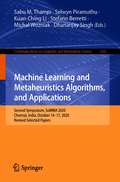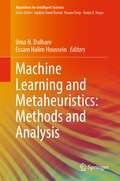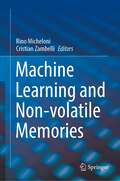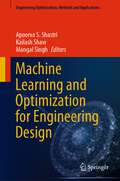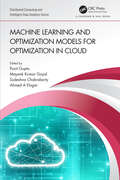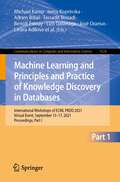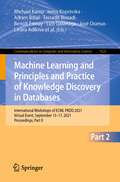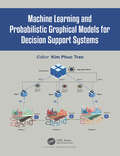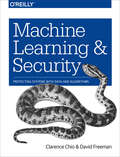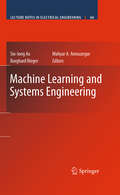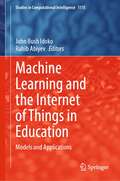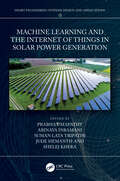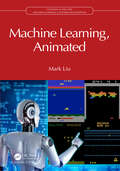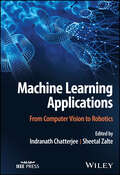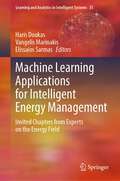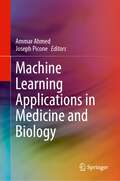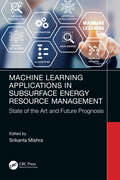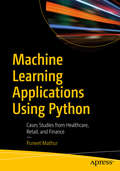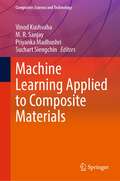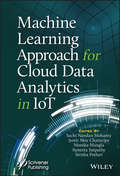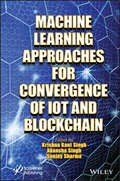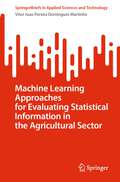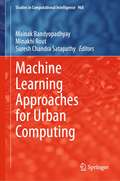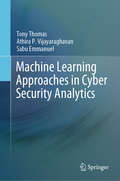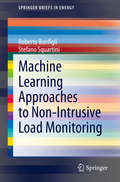- Table View
- List View
Machine Learning and Metaheuristics Algorithms, and Applications: Second Symposium, SoMMA 2020, Chennai, India, October 14–17, 2020, Revised Selected Papers (Communications in Computer and Information Science #1366)
by Sabu M. Thampi Selwyn Piramuthu Kuan-Ching Li Stefano Berretti Michal Wozniak Dhananjay SinghThis book constitutes the refereed proceedings of the Second Symposium on Machine Learning and Metaheuristics Algorithms, and Applications, SoMMA 2020, held in Chennai, India, in October 2020. Due to the COVID-19 pandemic the conference was held online. The 12 full papers and 7 short papers presented in this volume were thoroughly reviewed and selected from 40 qualified submissions. The papers cover such topics as machine learning, artificial intelligence, Internet of Things, modeling and simulation, disctibuted computing methodologies, computer graphics, etc.
Machine Learning and Metaheuristics: Methods and Analysis (Algorithms for Intelligent Systems)
by Uma N. Dulhare Essam Halim HousseinThis book takes a balanced approach between theoretical understanding and real-time applications. All the topics included real-world problems which show how to explore, build, evaluate, and optimize machine learning models fusion with metaheuristic algorithms. Optimization algorithms classified into two broad categories as deterministic and probabilistic algorithms. The content of book elaborates optimization algorithms such as particle swarm optimization, ant colony optimization, whale search algorithm, and cuckoo search algorithm.
Machine Learning and Non-volatile Memories
by Rino Micheloni Cristian ZambelliThis book presents the basics of both NAND flash storage and machine learning, detailing the storage problems the latter can help to solve. At a first sight, machine learning and non-volatile memories seem very far away from each other. Machine learning implies mathematics, algorithms and a lot of computation; non-volatile memories are solid-state devices used to store information, having the amazing capability of retaining the information even without power supply. This book will help the reader understand how these two worlds can work together, bringing a lot of value to each other. In particular, the book covers two main fields of application: analog neural networks (NNs) and solid-state drives (SSDs).After reviewing the basics of machine learning in Chapter 1, Chapter 2 shows how neural networks can mimic the human brain; to accomplish this result, neural networks have to perform a specific computation called vector-by-matrix (VbM) multiplication, which is particularly power hungry. In the digital domain, VbM is implemented by means of logic gates which dictate both the area occupation and the power consumption; the combination of the two poses serious challenges to the hardware scalability, thus limiting the size of the neural network itself, especially in terms of the number of processable inputs and outputs. Non-volatile memories (phase change memories in Chapter 3, resistive memories in Chapter 4, and 3D flash memories in Chapter 5 and Chapter 6) enable the analog implementation of the VbM (also called “neuromorphic architecture”), which can easily beat the equivalent digital implementation in terms of both speed and energy consumption.SSDs and flash memories are strictly coupled together; as 3D flash scales, there is a significant amount of work that has to be done in order to optimize the overall performances of SSDs. Machine learning has emerged as a viable solution in many stages of this process. After introducing the main flash reliability issues, Chapter 7 shows both supervised and un-supervised machine learning techniques that can be applied to NAND. In addition, Chapter 7 deals with algorithms and techniques for a pro-active reliability management of SSDs. Last but not least, the last section of Chapter 7 discusses the next challenge for machine learning in the context of the so-called computational storage.No doubt that machine learning and non-volatile memories can help each other, but we are just at the beginning of the journey; this book helps researchers understand the basics of each field by providing real application examples, hopefully, providing a good starting point for the next level of development.
Machine Learning and Optimization for Engineering Design (Engineering Optimization: Methods and Applications)
by Apoorva S. Shastri Kailash Shaw Mangal SinghThis book aims to provide a collection of state-of-the-art scientific and technical research papers related to machine learning-based algorithms in the field of optimization and engineering design. The theoretical and practical development for numerous engineering applications such as smart homes, ICT-based irrigation systems, academic success prediction, future agro-industry for crop production, disease classification in plants, dental problems and solutions, loan eligibility processing, etc., and their implementation with several case studies and literature reviews are included as self-contained chapters. Additionally, the book intends to highlight the importance of study and effectiveness in addressing the time and space complexity of problems and enhancing accuracy, analysis, and validations for different practical applications by acknowledging the state-of-the-art literature survey. The book targets a larger audience by exploring multidisciplinary research directions such as computer vision, machine learning, artificial intelligence, modified/newly developed machine learning algorithms, etc., to enhance engineering design applications for society. State-of-the-art research work with illustrations and exercises along with pseudo-code has been provided here.
Machine Learning and Optimization Models for Optimization in Cloud (Chapman & Hall/Distributed Computing and Intelligent Data Analytics Series)
by Punit Gupta, Mayank Kumar Goyal, Sudeshna Chakraborty and Ahmed A. ElngarMachine Learning and Models for Optimization in Cloud’s main aim is to meet the user requirement with high quality of service, least time for computation and high reliability. With increase in services migrating over cloud providers, the load over the cloud increases resulting in fault and various security failure in the system results in decreasing reliability. To fulfill this requirement cloud system uses intelligent metaheuristic and prediction algorithm to provide resources to the user in an efficient manner to manage the performance of the system and plan for upcoming requests. Intelligent algorithm helps the system to predict and find a suitable resource for a cloud environment in real time with least computational complexity taking into mind the system performance in under loaded and over loaded condition. This book discusses the future improvements and possible intelligent optimization models using artificial intelligence, deep learning techniques and other hybrid models to improve the performance of cloud. Various methods to enhance the directivity of cloud services have been presented which would enable cloud to provide better services, performance and quality of service to user. It talks about the next generation intelligent optimization and fault model to improve security and reliability of cloud. Key Features · Comprehensive introduction to cloud architecture and its service models. · Vulnerability and issues in cloud SAAS, PAAS and IAAS · Fundamental issues related to optimizing the performance in Cloud Computing using meta-heuristic, AI and ML models · Detailed study of optimization techniques, and fault management techniques in multi layered cloud. · Methods to improve reliability and fault in cloud using nature inspired algorithms and artificial neural network. · Advanced study of algorithms using artificial intelligence for optimization in cloud · Method for power efficient virtual machine placement using neural network in cloud · Method for task scheduling using metaheuristic algorithms. · A study of machine learning and deep learning inspired resource allocation algorithm for cloud in fault aware environment. This book aims to create a research interest & motivation for graduates degree or post-graduates. It aims to present a study on optimization algorithms in cloud for researchers to provide them with a glimpse of future of cloud computing in the era of artificial intelligence.
Machine Learning and Principles and Practice of Knowledge Discovery in Databases: International Workshops of ECML PKDD 2021, Virtual Event, September 13-17, 2021, Proceedings, Part I (Communications in Computer and Information Science #1524)
by Christopher Buckley Min Zhou Lee Cooper Rita Ribeiro Donato Malerba Bodo Rosenhahn João Gama Riccardo Guidotti Anna Monreale Pedro M. Ferreira Meng Sun Philippe Fournier-Viger Ricard Gavaldà Michael Kamp Yamuna Krishnamurthy Valerio Bitetta Ilaria Bordino Andrea Ferretti Francesco Gullo Christine Largeron Massimiliano Ruocco Giovanni Ponti Tim Verbelen Pablo Lanillos Holger Fröning Franz Pernkopf Gregor Schiele Michaela Blott Lorenzo Severini Przemyslaw Biecek Irena Koprinska Linara Adilova Ibéria Medeiros Eirini Ntoutsi Salvatore Rinzivillo Jefrey Lijffijt Adrien Bibal Tassadit Bouadi Benoît Frénay Luis Galárraga José Oramas Bo Kang Tiphaine Viard Pascal Welke Erlend Aune Claudio Gallicchio Günther Schindler Mykola Pechenizkiy Daniela Cialfi Maxwell Ramstead Giuseppina Andresini M. Saqib Nawaz Sebastian Ventura Naghmeh Ghazaleh Jonas Richiardi Damian Roqueiro Diego Saldana Miranda Konstantinos Sechidis Guilherme GraçaThis two-volume set constitutes the refereed proceedings of the workshops which complemented the 21th Joint European Conference on Machine Learning and Knowledge Discovery in Databases, ECML PKDD, held in September 2021. Due to the COVID-19 pandemic the conference and workshops were held online. The 104 papers were thoroughly reviewed and selected from 180 papers submited for the workshops. This two-volume set includes the proceedings of the following workshops:Workshop on Advances in Interpretable Machine Learning and Artificial Intelligence (AIMLAI 2021)Workshop on Parallel, Distributed and Federated Learning (PDFL 2021)Workshop on Graph Embedding and Mining (GEM 2021)Workshop on Machine Learning for Irregular Time-series (ML4ITS 2021)Workshop on IoT, Edge, and Mobile for Embedded Machine Learning (ITEM 2021)Workshop on eXplainable Knowledge Discovery in Data Mining (XKDD 2021)Workshop on Bias and Fairness in AI (BIAS 2021)Workshop on Workshop on Active Inference (IWAI 2021)Workshop on Machine Learning for Cybersecurity (MLCS 2021)Workshop on Machine Learning in Software Engineering (MLiSE 2021)Workshop on MIning Data for financial applications (MIDAS 2021)Sixth Workshop on Data Science for Social Good (SoGood 2021)Workshop on Machine Learning for Pharma and Healthcare Applications (PharML 2021)Second Workshop on Evaluation and Experimental Design in Data Mining and Machine Learning (EDML 2020)Workshop on Machine Learning for Buildings Energy Management (MLBEM 2021)
Machine Learning and Principles and Practice of Knowledge Discovery in Databases: International Workshops of ECML PKDD 2021, Virtual Event, September 13-17, 2021, Proceedings, Part II (Communications in Computer and Information Science #1525)
by Christopher Buckley Min Zhou Lee Cooper Rita Ribeiro Donato Malerba Bodo Rosenhahn João Gama Riccardo Guidotti Anna Monreale Pedro M. Ferreira Meng Sun Philippe Fournier-Viger Ricard Gavaldà Michael Kamp Yamuna Krishnamurthy Valerio Bitetta Ilaria Bordino Andrea Ferretti Francesco Gullo Christine Largeron Massimiliano Ruocco Giovanni Ponti Tim Verbelen Pablo Lanillos Holger Fröning Franz Pernkopf Gregor Schiele Michaela Blott Lorenzo Severini Przemyslaw Biecek Irena Koprinska Linara Adilova Ibéria Medeiros Eirini Ntoutsi Salvatore Rinzivillo Jefrey Lijffijt Adrien Bibal Tassadit Bouadi Benoît Frénay Luis Galárraga José Oramas Bo Kang Tiphaine Viard Pascal Welke Erlend Aune Claudio Gallicchio Günther Schindler Mykola Pechenizkiy Daniela Cialfi Maxwell Ramstead Giuseppina Andresini M. Saqib Nawaz Sebastian Ventura Naghmeh Ghazaleh Jonas Richiardi Damian Roqueiro Diego Saldana Miranda Konstantinos Sechidis Guilherme GraçaThis two-volume set constitutes the refereed proceedings of the workshops which complemented the 21th Joint European Conference on Machine Learning and Knowledge Discovery in Databases, ECML PKDD, held in September 2021. Due to the COVID-19 pandemic the conference and workshops were held online. The 104 papers were thoroughly reviewed and selected from 180 papers submited for the workshops. This two-volume set includes the proceedings of the following workshops:Workshop on Advances in Interpretable Machine Learning and Artificial Intelligence (AIMLAI 2021)Workshop on Parallel, Distributed and Federated Learning (PDFL 2021)Workshop on Graph Embedding and Mining (GEM 2021)Workshop on Machine Learning for Irregular Time-series (ML4ITS 2021)Workshop on IoT, Edge, and Mobile for Embedded Machine Learning (ITEM 2021)Workshop on eXplainable Knowledge Discovery in Data Mining (XKDD 2021)Workshop on Bias and Fairness in AI (BIAS 2021)Workshop on Workshop on Active Inference (IWAI 2021)Workshop on Machine Learning for Cybersecurity (MLCS 2021)Workshop on Machine Learning in Software Engineering (MLiSE 2021)Workshop on MIning Data for financial applications (MIDAS 2021)Sixth Workshop on Data Science for Social Good (SoGood 2021)Workshop on Machine Learning for Pharma and Healthcare Applications (PharML 2021)Second Workshop on Evaluation and Experimental Design in Data Mining and Machine Learning (EDML 2020)Workshop on Machine Learning for Buildings Energy Management (MLBEM 2021)
Machine Learning and Probabilistic Graphical Models for Decision Support Systems
by Kim Phuc TranThis book presents recent advancements in research, a review of new methods and techniques, and applications in decision support systems (DSS) with Machine Learning and Probabilistic Graphical Models, which are very effective techniques in gaining knowledge from Big Data and in interpreting decisions. It explores Bayesian network learning, Control Chart, Reinforcement Learning for multicriteria DSS, Anomaly Detection in Smart Manufacturing with Federated Learning, DSS in healthcare, DSS for supply chain management, etc. Researchers and practitioners alike will benefit from this book to enhance the understanding of machine learning, Probabilistic Graphical Models, and their uses in DSS in the context of decision making with uncertainty. The real-world case studies in various fields with guidance and recommendations for the practical applications of these studies are introduced in each chapter.
Machine Learning and Security: Protecting Systems with Data and Algorithms
by Clarence Chio David FreemanCan machine learning techniques solve our computer security problems and finally put an end to the cat-and-mouse game between attackers and defenders? Or is this hope merely hype? Now you can dive into the science and answer this question for yourself! With this practical guide, you’ll explore ways to apply machine learning to security issues such as intrusion detection, malware classification, and network analysis.Machine learning and security specialists Clarence Chio and David Freeman provide a framework for discussing the marriage of these two fields, as well as a toolkit of machine-learning algorithms that you can apply to an array of security problems. This book is ideal for security engineers and data scientists alike.Learn how machine learning has contributed to the success of modern spam filtersQuickly detect anomalies, including breaches, fraud, and impending system failureConduct malware analysis by extracting useful information from computer binariesUncover attackers within the network by finding patterns inside datasetsExamine how attackers exploit consumer-facing websites and app functionalityTranslate your machine learning algorithms from the lab to productionUnderstand the threat attackers pose to machine learning solutions
Machine Learning and Systems Engineering
by Burghard B. Rieger Mahyar Amouzegar Sio-Iong AoA large international conference on Advances in Machine Learning and Systems Engineering was held in UC Berkeley, California, USA, October 20-22, 2009, under the auspices of the World Congress on Engineering and Computer Science (WCECS 2009). Machine Learning and Systems Engineering contains forty-six revised and extended research articles written by prominent researchers participating in the conference. Topics covered include Expert system, Intelligent decision making, Knowledge-based systems, Knowledge extraction, Data analysis tools, Computational biology, Optimization algorithms, Experiment designs, Complex system identification, Computational modeling, and industrial applications. Machine Learning and Systems Engineering offers the state of the art of tremendous advances in machine learning and systems engineering and also serves as an excellent reference text for researchers and graduate students, working on machine learning and systems engineering.
Machine Learning and the Internet of Things in Education: Models and Applications (Studies in Computational Intelligence #1115)
by John Bush Idoko Rahib AbiyevThis book is designed to provide rich research hub for researchers, teachers, and students to ease research hassle/challenges. The book is rich and comprehensive enough to provide answers to frequently asked research questions because the content of the book touches several disciplines cutting across computing, engineering, medicine, education, and sciences in general. The rich multidisciplinary contents of the book promise to leave all users satisfied. The valuable features in the book include but not limited to: demonstration of mathematical expressions for implementation of machine learning models, integration of learning techniques, and projection of future AI and IoT technologies. These technologies will enable systems to be simulative, predictive, and self-operating smart systems. The primary audience of the book include but not limited to researchers, teachers, and postgraduate and undergraduate students in computing, engineering, medicine, education, and science fields.
Machine Learning and the Internet of Things in Solar Power Generation (Smart Engineering Systems: Design and Applications)
by Prabha Umapathy Abinaya Inbamani Suman Lata Tripathi Jude Hemanth Shelej KheraThe book investigates various MPPT algorithms, and the optimization of solar energy using machine learning and deep learning. It will serve as an ideal reference text for senior undergraduate, graduate students, and academic researchers in diverse engineering domains including electrical, electronics and communication, computer, and environmental.This book: Discusses data acquisition by the internet of things for real-time monitoring of solar cells. Covers artificial neural network techniques, solar collector optimization, and artificial neural network applications in solar heaters, and solar stills. Details solar analytics, smart centralized control centers, integration of microgrids, and data mining on solar data. Highlights the concept of asset performance improvement, effective forecasting for energy production, and Low-power wide-area network applications. Elaborates solar cell design principles, the equivalent circuits of single and two diode models, measuring idealist factors, and importance of series and shunt resistances. The text elaborates solar cell design principles, the equivalent circuit of single diode model, the equivalent circuit of two diode model, measuring idealist factor, and importance of series and shunt resistances. It further discusses perturb and observe technique, modified P&O method, incremental conductance method, sliding control method, genetic algorithms, and neuro-fuzzy methodologies. It will serve as an ideal reference text for senior undergraduate, graduate students, and academic researchers in diverse engineering domains including electrical, electronics and communication, computer, and environmental.
Machine Learning, Animated (Chapman And Hall/crc Machine Learning And Pattern Recognition Ser.)
by Mark LiuThe release of ChatGPT has kicked off an arms race in Machine Learning (ML), however ML has also been described as a black box and very hard to understand. Machine Learning, Animated eases you into basic ML concepts and summarizes the learning process in three words: initialize, adjust and repeat. This is illustrated step by step with animation to show how machines learn: from initial parameter values to adjusting each step, to the final converged parameters and predictions. This book teaches readers to create their own neural networks with dense and convolutional layers, and use them to make binary and multi-category classifications. Readers will learn how to build deep learning game strategies and combine this with reinforcement learning, witnessing AI achieve super-human performance in Atari games such as Breakout, Space Invaders, Seaquest and Beam Rider. Written in a clear and concise style, illustrated with animations and images, this book is particularly appealing to readers with no background in computer science, mathematics or statistics. Access the book's repository at: https://github.com/markhliu/MLA
Machine Learning Applications: From Computer Vision to Robotics
by Indranath Chatterjee Sheetal ZalteMachine Learning Applications Practical resource on the importance of Machine Learning and Deep Learning applications in various technologies and real-world situations Machine Learning Applications discusses methodological advancements of machine learning and deep learning, presents applications in image processing, including face and vehicle detection, image classification, object detection, image segmentation, and delivers real-world applications in healthcare to identify diseases and diagnosis, such as creating smart health records and medical imaging diagnosis, and provides real-world examples, case studies, use cases, and techniques to enable the reader’s active learning. Composed of 13 chapters, this book also introduces real-world applications of machine and deep learning in blockchain technology, cyber security, and climate change. An explanation of AI and robotic applications in mechanical design is also discussed, including robot-assisted surgeries, security, and space exploration. The book describes the importance of each subject area and detail why they are so important to us from a societal and human perspective. Edited by two highly qualified academics and contributed to by established thought leaders in their respective fields, Machine Learning Applications includes information on: Content based medical image retrieval (CBMIR), covering face and vehicle detection, multi-resolution and multisource analysis, manifold and image processing, and morphological processing Smart medicine, including machine learning and artificial intelligence in medicine, risk identification, tailored interventions, and association rules AI and robotics application for transportation and infrastructure (e.g., autonomous cars and smart cities), along with global warming and climate change Identifying diseases and diagnosis, drug discovery and manufacturing, medical imaging diagnosis, personalized medicine, and smart health records With its practical approach to the subject, Machine Learning Applications is an ideal resource for professionals working with smart technologies such as machine and deep learning, AI, IoT, and other wireless communications; it is also highly suitable for professionals working in robotics, computer vision, cyber security and more.
Machine Learning Applications for Intelligent Energy Management: Invited Chapters from Experts on the Energy Field (Learning and Analytics in Intelligent Systems #35)
by Haris Doukas Vangelis Marinakis Elissaios SarmasAs carbon dioxide (CO2) emissions and other greenhouse gases constantly rise and constitute the main contributor to climate change, temperature rise and global warming, artificial intelligence, big data, Internet of things, and blockchain technologies are enlisted to help enforce energy transition and transform the entire energy sector. The book at hand presents state-of-the-art developments in artificial intelligence-empowered analytics of energy data and artificial intelligence-empowered application development. Topics covered include a presentation of the various stakeholders in the energy sector and their corresponding required analytic services, such as state-of-the-art machine learning, artificial intelligence, and optimization models and algorithms tailored for a series of demanding energy problems and aiming at providing optimal solutions under specific constraints. Professors, researchers, scientists, engineers, and students in energy sector-related disciplines are expected to be inspired and benefit from this book, along with readers from other disciplines wishing to learn more about this exciting new field of research.
Machine Learning Applications in Medicine and Biology
by Ammar Ahmed Joseph PiconeThis book combines selected papers from the 2022 IEEE Signal Processing in Medicine and Biology Symposium (IEEE SPMB) held at Temple University. The symposium presents multidisciplinary research in the life sciences. Topics covered include:Signal and image analysis (EEG, ECG, MRI)Machine learningData mining and classificationBig data resourcesApplications of particular interest at the 2022 symposium included digital pathology, computational biology, and quantum computing. The book features tutorials and examples of successful applications that will appeal to a wide range of professionals and researchers in signal processing, medicine, and biology.
Machine Learning Applications in Subsurface Energy Resource Management: State of the Art and Future Prognosis
by Srikanta MishraThe utilization of machine learning (ML) techniques to understand hidden patterns and build data-driven predictive models from complex multivariate datasets is rapidly increasing in many applied science and engineering disciplines, including geo-energy. Motivated by these developments, Machine Learning Applications in Subsurface Energy Resource Management presents a current snapshot of the state of the art and future outlook for ML applications to manage subsurface energy resources (e.g., oil and gas, geologic carbon sequestration, and geothermal energy). Covers ML applications across multiple application domains (reservoir characterization, drilling, production, reservoir modeling, and predictive maintenance) Offers a variety of perspectives from authors representing operating companies, universities, and research organizations Provides an array of case studies illustrating the latest applications of several ML techniques Includes a literature review and future outlook for each application domain This book is targeted at practicing petroleum engineers or geoscientists interested in developing a broad understanding of ML applications across several subsurface domains. It is also aimed as a supplementary reading for graduate-level courses and will also appeal to professionals and researchers working with hydrogeology and nuclear waste disposal.
Machine Learning Applications Using Python: Cases Studies from Healthcare, Retail, and Finance
by Puneet MathurGain practical skills in machine learning for finance, healthcare, and retail. This book uses a hands-on approach by providing case studies from each of these domains: you’ll see examples that demonstrate how to use machine learning as a tool for business enhancement. As a domain expert, you will not only discover how machine learning is used in finance, healthcare, and retail, but also work through practical case studies where machine learning has been implemented. Machine Learning Applications Using Python is divided into three sections, one for each of the domains (healthcare, finance, and retail). Each section starts with an overview of machine learning and key technological advancements in that domain. You’ll then learn more by using case studies on how organizations are changing the game in their chosen markets. This book has practical case studies with Python code and domain-specific innovative ideas for monetizing machine learning. What You Will LearnDiscover applied machine learning processes and principlesImplement machine learning in areas of healthcare, finance, and retailAvoid the pitfalls of implementing applied machine learningBuild Python machine learning examples in the three subject areasWho This Book Is ForData scientists and machine learning professionals.
Machine Learning Applied to Composite Materials (Composites Science and Technology)
by Vinod Kushvaha M. R. Sanjay Priyanka Madhushri Suchart SiengchinThis book introduces the approach of Machine Learning (ML) based predictive models in the design of composite materials to achieve the required properties for certain applications. ML can learn from existing experimental data obtained from very limited number of experiments and subsequently can be trained to find solutions of the complex non-linear, multi-dimensional functional relationships without any prior assumptions about their nature. In this case the ML models can learn from existing experimental data obtained from (1) composite design based on various properties of the matrix material and fillers/reinforcements (2) material processing during fabrication (3) property relationships. Modelling of these relationships using ML methods significantly reduce the experimental work involved in designing new composites, and therefore offer a new avenue for material design and properties. The book caters to students, academics and researchers who are interested in the field of material composite modelling and design.
Machine Learning Approach for Cloud Data Analytics in IoT
by Sachi Nandan Mohanty Jyotir Moy Chatterjee Monika Mangla Suneeta Satpathy Sirisha PotluriIn this era of IoT, edge devices generate gigantic data during every fraction of a second. The main aim of these networks is to infer some meaningful information from the collected data. For the same, the huge data is transmitted to the cloud which is highly expensive and time-consuming. Hence, it needs to devise some efficient mechanism to handle this huge data, thus necessitating efficient data handling techniques. Sustainable computing paradigms like cloud and fog are expedient to capably handle the issues of performance, capabilities allied to storage and processing, maintenance, security, efficiency, integration, cost, energy and latency. However, it requires sophisticated analytics tools so as to address the queries in an optimized time. Hence, rigorous research is taking place in the direction of devising effective and efficient framework to garner utmost advantage. Machine learning has gained unmatched popularity for handling massive amounts of data and has applications in a wide variety of disciplines, including social media. Machine Learning Approach for Cloud Data Analytics in IoT details and integrates all aspects of IoT, cloud computing and data analytics from diversified perspectives. It reports on the state-of-the-art research and advanced topics, thereby bringing readers up to date and giving them a means to understand and explore the spectrum of applications of IoT, cloud computing and data analytics.
Machine Learning Approaches for Convergence of IoT and Blockchain
by Krishna Kant Singh Akansha Singh Sanjay SharmaThe digital revolution is characterized by the convergence of technologies, rapidly advancing the 4th industrial revolution thereby blurring the lines between physical, digital and biological objects. The speed of the fourth revolution which evolves at an exponential rate cannot by any means be compared with any previous technologies. AI and IoT employ the interactions and operations in various fields such as home appliances, autonomous vehicles, nanotechnology, robotics, cognitive systems, self-driving cars and wearable devices. The potential of blockchain technology is realized in many sectors as security plays a crucial role everywhere. This book deeply discusses two of the most critical emerging fields of machine learning: blockchain technology and the Internet of Things.
Machine Learning Approaches for Evaluating Statistical Information in the Agricultural Sector (SpringerBriefs in Applied Sciences and Technology)
by Vitor Joao MartinhoThis book presents machine learning approaches to identify the most important predictors of crucial variables for dealing with the challenges of managing production units and designing agriculture policies. The book focuses on the agricultural sector in the European Union and considers statistical information from the Farm Accountancy Data Network (FADN).Presently, statistical databases present a lot of information for many indicators and, in these contexts, one of the main tasks is to identify the most important predictors of certain indicators. In this way, the book presents approaches to identifying the most relevant variables that best support the design of adjusted farming policies and management plans. These subjects are currently important for students, public institutions and farmers. To achieve these objectives, the book considers the IBM SPSS Modeler procedures as well as the respective models suggested by this software.The book is read by students in production engineering, economics and agricultural studies, public bodies and managers in the farming sector.
Machine Learning Approaches for Urban Computing (Studies in Computational Intelligence #968)
by Mainak Bandyopadhyay Minakhi Rout Suresh Chandra SatapathyThis book discusses various machine learning applications and models, developed using heterogeneous data, which helps in a comprehensive prediction, optimization, association analysis, cluster analysis and classification-related applications for various activities in urban area. It details multiple types of data generating from urban activities and suitability of various machine learning algorithms for handling urban data. The book is helpful for researchers, academicians, faculties, scientists and geospatial industry professionals for their research work and sets new ideas in the field of urban computing.
Machine Learning Approaches in Cyber Security Analytics
by Tony Thomas Athira P. Vijayaraghavan Sabu EmmanuelThis book introduces various machine learning methods for cyber security analytics. With an overwhelming amount of data being generated and transferred over various networks, monitoring everything that is exchanged and identifying potential cyber threats and attacks poses a serious challenge for cyber experts. Further, as cyber attacks become more frequent and sophisticated, there is a requirement for machines to predict, detect, and identify them more rapidly. Machine learning offers various tools and techniques to automate and quickly predict, detect, and identify cyber attacks.
Machine Learning Approaches to Non-Intrusive Load Monitoring (SpringerBriefs in Energy)
by Roberto Bonfigli Stefano SquartiniResearch on Smart Grids has recently focused on the energy monitoring issue, with the objective of maximizing the user consumption awareness in building contexts on the one hand, and providing utilities with a detailed description of customer habits on the other. In particular, Non-Intrusive Load Monitoring (NILM), the subject of this book, represents one of the hottest topics in Smart Grid applications. NILM refers to those techniques aimed at decomposing the consumption-aggregated data acquired at a single point of measurement into the diverse consumption profiles of appliances operating in the electrical system under study. This book provides a status report on the most promising NILM methods, with an overview of the publically available dataset on which the algorithm and experiments are based. Of the proposed methods, those based on the Hidden Markov Model (HMM) and the Deep Neural Network (DNN) are the best performing and most interesting from the future improvement point of view. One method from each category has been selected and the performance improvements achieved are described. Comparisons are made between the two reference techniques, and pros and cons are considered. In addition, performance improvements can be achieved when the reactive power component is exploited in addition to the active power consumption trace.
